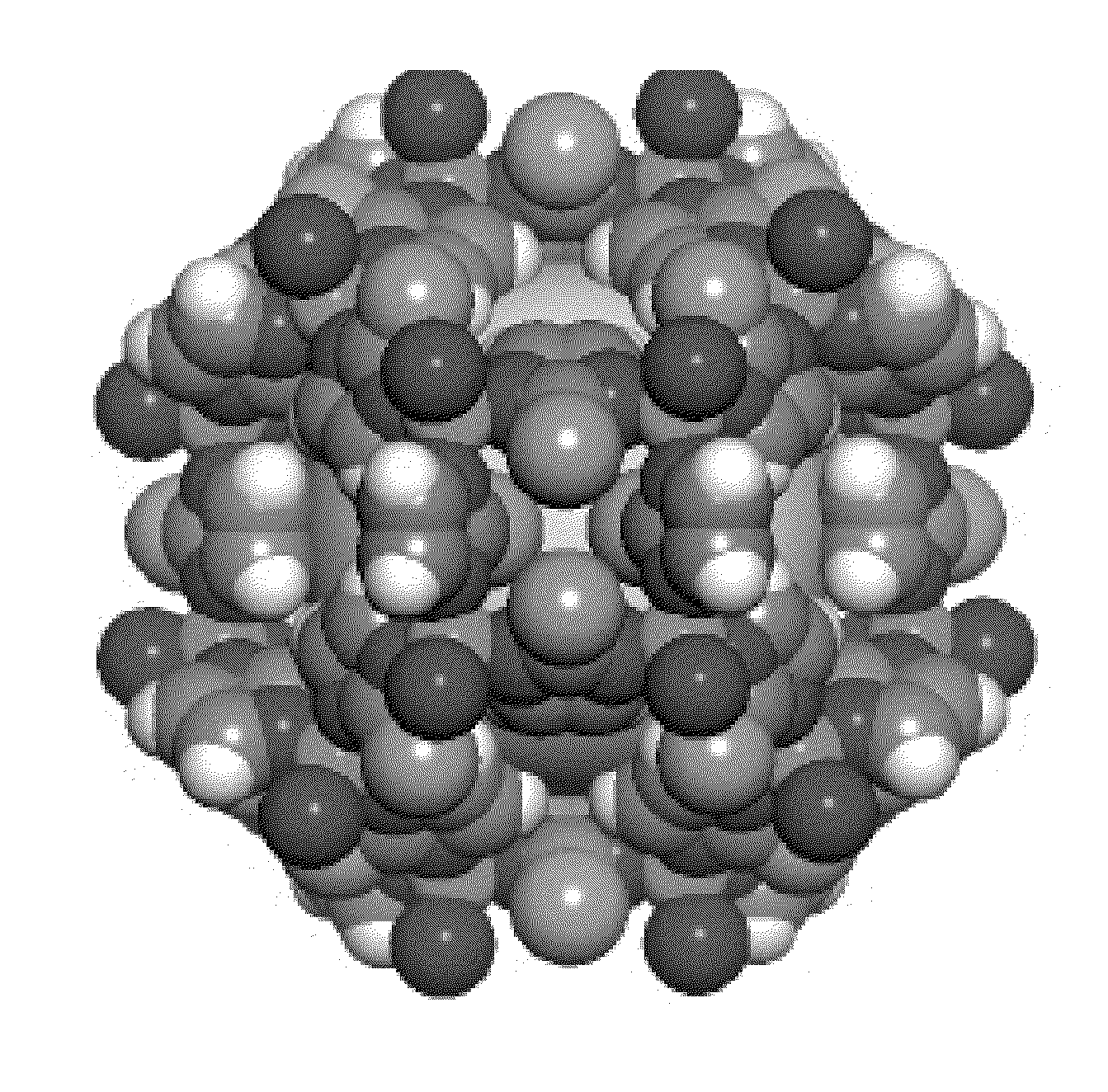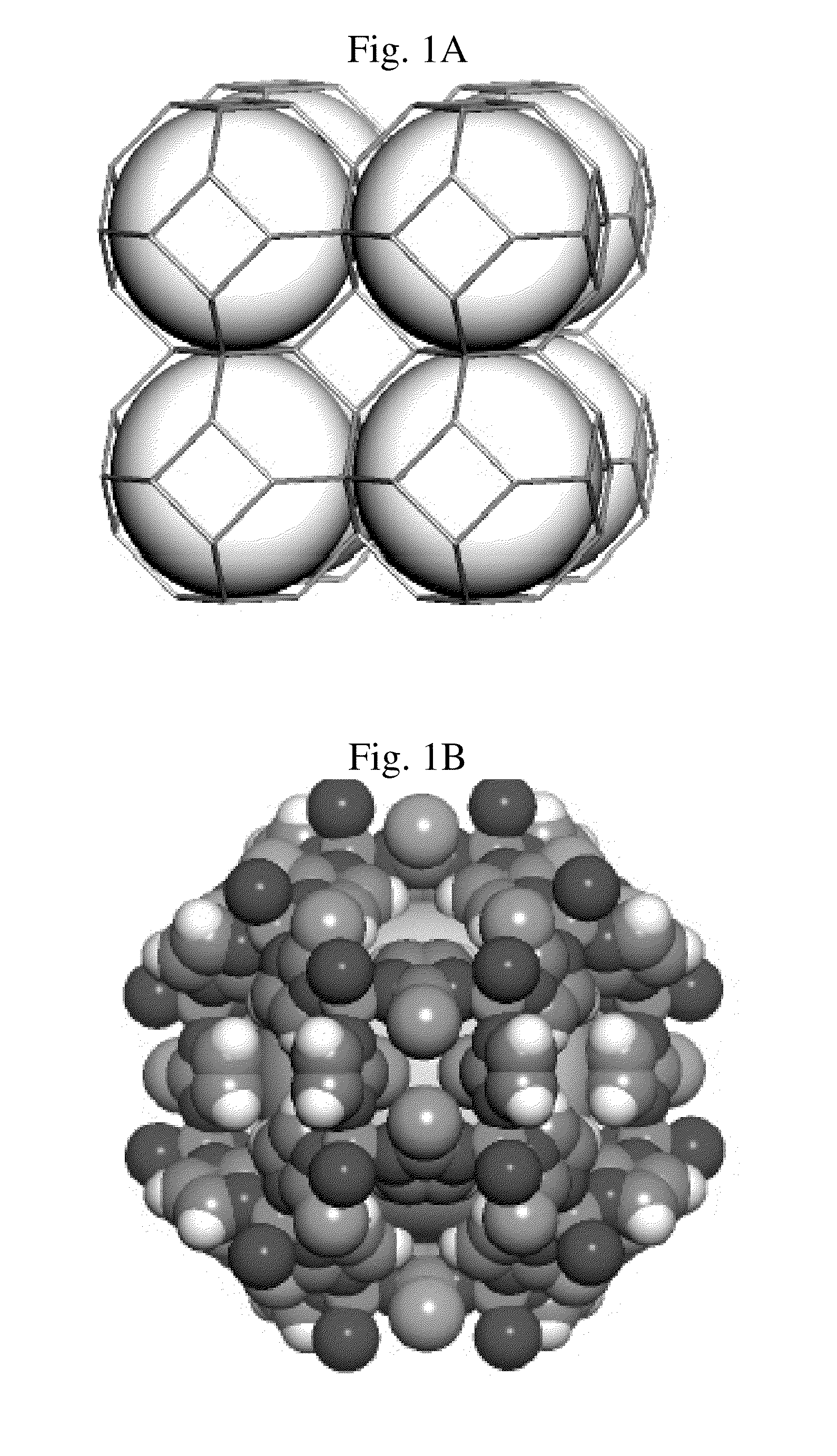Zeolitic imidazolate frameworks for kinetic separation of propane and propene
a technology of kinetic separation and imidazolate, which is applied in the direction of dispersed particle separation, separation process, organic chemistry, etc., to achieve the effect of different relative diffusion rate, different energy- and cost-efficient rates, and significant differences in diffusion rates
- Summary
- Abstract
- Description
- Claims
- Application Information
AI Technical Summary
Benefits of technology
Problems solved by technology
Method used
Image
Examples
example 1
Synthesis of 2-chloroimidazole (2-cim)
[0035]To a 300-mL, three-neck, round-bottom flask equipped with a magnetic stirrer and argon inlet, were added N-tritylimidazole (3.14 g, 0.01 mol) and anhydrous THF (140 mL). The stirrer was started, and the solution was cooled to −78° C. (acetone / dry ice). n-BuLi (2.5 M in hexanes, 8.0 mL, 0.02 mol) was added via syringe resulting in reddish solution. This solution was stirred for 60 min whereupon hexachloroethane (5.0 g, 0.021 mol) in THF (25 mL) was added in portions.
[0036]The reaction mixture was stirred for 1 additional hour and then quenched with saturated aqueous ammonium chloride (100 mL). The cooling bath was removed, and when the reaction flask reached room temperature the contents were transferred to a 500 mL separatory funnel, and extracted with ethyl acetate (50 mL×2). The organic layer was separated, washed with water and brine, and dried over anhydrous sodium sulfate.
[0037]After filtration, the solvents were evaporated under redu...
example 2
Crystal Growth of Compounds 1-3
[0038]Zinc nitrate hexahydrate (120 mg, 0.4 mmol) and 2-cim (108 mg, 1 mmol) were added to methanol (4 mL) in a glass vial. The mixture was homogenized by sonication for 2 mins. Then the vial was capped and placed into 100° C. oven for two days. Colorless polyhedral crystals of Compound 1 (See FIG. 4) were obtained (42 mg). Similarly, crystals of Compound 2 (55 mg) were obtained (See FIG. 5) by reacting zinc nitrate hexahydrate (121 mg, 0.4 mmol) and 2-bim (120 mg, 0.8 mmol) in ethanol (95%, 4 mL) for 2 days.
[0039]To a mixture of 2-methylimidazole (0.20 g, 2.5 mmol) and zinc nitrate hexahydrate (0.35 g, 1.2 mmol) in a glass vial was added N,N-dimethylformamide (DMF, 15 mL). Three drops of concentrated nitric acid was added to the suspension to obtain a clear solution. The vial was capped and placed in an isothermal oven at 120° C. for 2 days. Big polyhedral crystals of Compound 3 were obtained (40 mg, see FIG. 3).
example 3
Selected Crystallographic and Thermal Data of Compounds 1, 2 and 3
[0040]Compounds 1-3 obtained as described in the previous examples are characterized in Tables 2-4, respectively.
TABLE 2Crystal data and structure refinement parameters for Compound 1.Empirical formulaC8.1 H12.4 Cl2 N4 O2.1 ZnFormula weight335.42Temperature100(2) KWavelength0.71073 ÅCrystal systemCubicSpace groupI-43mUnit cell dimensionsa = 16.9824(4) Åα = 90°.b = 16.9824(4) Åβ = 90°.c = 16.9824(4) Åγ = 90°.Volume4897.8(2) Å3Z12Density (calculated)1.365 Mg / m3Absorption coefficient1.829 mm−1F(000)2036Crystal size0.19 × 0.08 × 0.05 mm3Theta range for data collection1.70 to 30.49°.Index ranges−24 k Reflections collected21497Independent reflections1415 [R(int) = 0.0265]Completeness to theta = 30.49°100.0%Absorption correctionSemi-empirical from equivalentsMax. and min. transmission0.9141 and 0.7226Refinement methodFull-matrix least-squares on F2Data / restraints / parameters1415 / 0 / 70Goodness-of-fit on F21.009Final R indices [...
PUM
| Property | Measurement | Unit |
|---|---|---|
| Temperature | aaaaa | aaaaa |
| Temperature | aaaaa | aaaaa |
| Volume | aaaaa | aaaaa |
Abstract
Description
Claims
Application Information
 Login to View More
Login to View More - R&D
- Intellectual Property
- Life Sciences
- Materials
- Tech Scout
- Unparalleled Data Quality
- Higher Quality Content
- 60% Fewer Hallucinations
Browse by: Latest US Patents, China's latest patents, Technical Efficacy Thesaurus, Application Domain, Technology Topic, Popular Technical Reports.
© 2025 PatSnap. All rights reserved.Legal|Privacy policy|Modern Slavery Act Transparency Statement|Sitemap|About US| Contact US: help@patsnap.com



